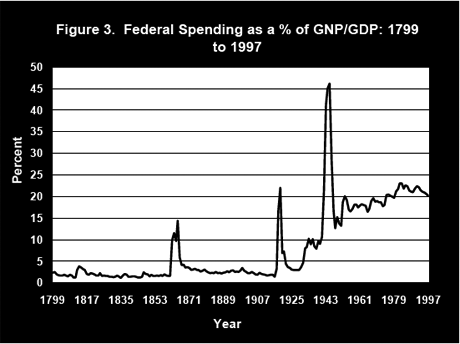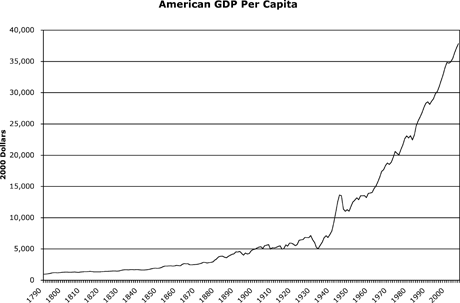Update: For those who prefer the (in this case unequivocal) aggregate opinions of economists and econometricians who have studied this subject, I recommend this review of those experts’ efforts. Their conclusions resoundingly debunk the faith-based spending-and-taxes-kill-growth belief system (even as some of those experts continue to cling to it in direct contradiction of their own data and analyses).
In the previous post I pointed out that in America, the rocket ship of prosperity and GDP growth didn’t take off until after the New Deal, and after WWII–when taxes as a percentage of GDP were higher (45%) than at any time before or since.
Here are the visuals to prove it:

Source. Note that this chart does not include state and local spending.

GDP growth, dismal for 140 years, took off at the same time that taxes and spending increased. Once again: this doesn’t prove that the higher government spending caused the GDP growth. (Though it certainly suggests it.) I does prove that the increased spending did not prevent the spectacular growth in prosperity over the last 70 years–a direct contradiction of what the anti-tax zealots would have you believe.
In the long term, the institutions that taxes pay for are the very things that allow for increasing prosperity. We need a certain amount of government. And we need to pay for it with taxes–not with money borrowed against our grandchildren’s earnings. Not complicated.
Added 12/20/07:
Spencer over on Megan McCardle’s blog makes the very good additional point:
From 1854 to 1919 their were 16 business cycles with an average contraction of 22 months and an expansion of 27 months. So the economy was in a recession some 45% of the time.
From WW II until 2001 there were 10 cycles with an average contraction of 10 months and an expansion of 57 months. So since the advent of big government and the modern Fed the US economy has been in recessions only 15% of the time.